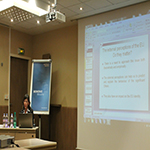Euroacademia Conferences
 Europe Inside-Out: Europe and Europeanness Exposed to Plural Observers (9th Edition) April 24 - 25, 2020
Europe Inside-Out: Europe and Europeanness Exposed to Plural Observers (9th Edition) April 24 - 25, 2020 Identities and Identifications: Politicized Uses of Collective Identities (9th Edition) June 12 - 13, 2020
Identities and Identifications: Politicized Uses of Collective Identities (9th Edition) June 12 - 13, 2020 8th Forum of Critical Studies: Asking Big Questions Again January 24 - 25, 2020
8th Forum of Critical Studies: Asking Big Questions Again January 24 - 25, 2020 Re-Inventing Eastern Europe (7th Edition) December 13 - 14, 2019
Re-Inventing Eastern Europe (7th Edition) December 13 - 14, 2019 The European Union and the Politicization of Europe (8th Edition) October 25 - 26, 2019
The European Union and the Politicization of Europe (8th Edition) October 25 - 26, 2019 Identities and Identifications: Politicized Uses of Collective Identities (8th Edition) June 28 - 29, 2019
Identities and Identifications: Politicized Uses of Collective Identities (8th Edition) June 28 - 29, 2019 The European Union and the Politicization of Europe (7th Edition) January 25 - 26, 2019
The European Union and the Politicization of Europe (7th Edition) January 25 - 26, 2019 7th Forum of Critical Studies: Asking Big Questions Again November 23 - 24, 2018
7th Forum of Critical Studies: Asking Big Questions Again November 23 - 24, 2018 Europe Inside-Out: Europe and Europeanness Exposed to Plural Observers (8th Edition) September 28 - 30, 2018
Europe Inside-Out: Europe and Europeanness Exposed to Plural Observers (8th Edition) September 28 - 30, 2018 Identities and Identifications: Politicized Uses of Collective Identities (7th Edition) June 14 - 15, 2018
Identities and Identifications: Politicized Uses of Collective Identities (7th Edition) June 14 - 15, 2018
The Role of External Perceptions in the European Identity Formation
-
-

-
Presentation speakers
- Irina Khayrizamanova, Institut Universitari d’Estudis Europeus, Universitat Autònoma de Barcelona
- Download presentation
Abstract:
The question if the European Union is an actor and what kind of an actor has been an object of numerous theoretical and empirical investigations within the International Relations and European Studies. While the overwhelming number of scholars has come to the conclusion that the EU is an actor, the EU´s identity defies easy classification. One of the few points that scholars seem to agree on is that the EU is definitely a distinctive actor. However, the research has tended to be self-reflexive and the EU-centered because the Other´s perspective has been widely neglected, despite the fact that the Other´s role in the European identity formation has been acknowledged. So it has to be pointed out that the alleged distinctiveness of the EU acquires meaning only if it is recognized by its relevant outsiders. In this sense, the EU leaders, who are the active creators of the European nascent identity, in their aspirations for a more active role for the EU in the world as a promoter of such values as multilateralism, democracy, liberty, rule of law and respect for human rights, should take into account how other actors respond to such claims. This made the academia aware of the necessity of a new approach that would illuminate the way the external perceptions contribute to the formation of the EU´s identity and consequently, to the adoption by the EU of foreign policy roles. This paper attempts to reverse the Self/Other theorizing with the aim to develop a theoretical explanation of the linkages between the external images and the EU´s identity formation, which in turn has a direct bearing on the EU´s foreign policy roles.
-
Related Presentations

Shall EU Survive? EU on the Verge of Balkanization: The Impact of Economic Theory and Economic Policy on the Future of EU
- Dragoljub Stojanov

Theoretical Perspectives for the EU Presence in the UN Institutional Structure
- Julija Brsakoska Bazerkoska

European Parliament as a Cosmopolitan Parliament
- Helena Koutchoura















